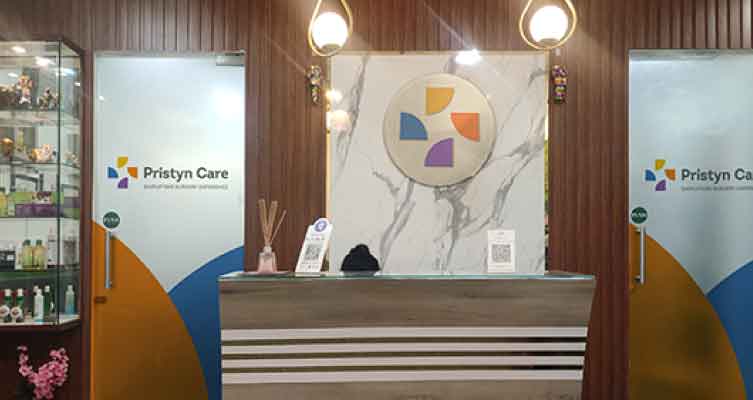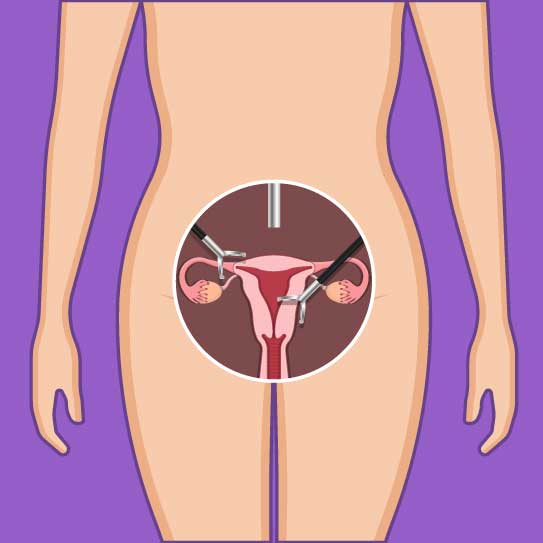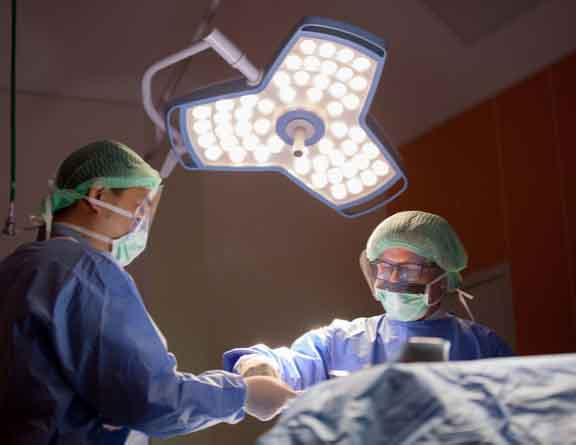Types of hysterectomy surgeries
- Abdominal hysterectomy- This operation is performed through the abdomen, where the gynecologist makes an incision in the lower part of the abdomen to perform the operation.
- Vaginal Hysterectomy: The surgeon makes an incision in the vagina and removes the uterus through this incision. The incision is then closed, leaving no visible scar.
- Laparoscopic Hysterectomy: This surgery is done with a laparoscope- a tube with a lighted camera, and specialized surgical tools inserted through three-four small keyhole incisions made in the abdomen.
- Laparoscopic-assisted vaginal hysterectomy: The laparoscopic tools are inserted in the belly through small cuts to assist in the removal of the uterus through an incision in the vagina.
10 Things you should know about hysterectomy
While the surgery does have a lasting effect on your body for which you will need time to recover, this however does not mean that you cannot have sex or never experience sex similarly. You can have sex once your doctor approves that you have healed enough and sexual activity won’t cause any post-surgical complications.
- Hysterectomy does not cure endometriosis
Endometriosis is a condition that is characterized by severe menstrual cramps, chronic pain, and painful intercourse, it is not cured by removal of the uterus, according to the Office on Women’s Health at the U.S. Department of Health and Human Services. The many treatment options which include pain medications and hormone therapies, hysterectomy with removal of the ovaries is not a first-line treatment.
- You would not necessarily go into menopause
The myth about hysterectomy is that a woman will go into menopause after going through the operation. It is true that you would not have periods, and can’t get pregnant after your uterus is removed but that doesn’t necessarily mean menopause. Unless your ovaries are removed in the surgery, women who have not experienced menopause before the surgery will likely undergo menstrual cycles without bleeding. However, hysterectomy can cause an early onset of menopause.
- Hysterectomy can include removal of ovaries
If you had a radical hysterectomy, your ovaries may also be removed during the surgery. Ovaries are the source of female hormones estrogen and progesterone. These are critical for both sexual health and bone health. Loss of ovaries also means these hormones will no longer be produced by them due to their absence. This induces a condition known as surgical menopause. This sudden loss of female hormones can cause stronger symptoms of menopause, including hot flashes and loss of sex drive.
- Hormone therapy for recovery
If you have a hysterectomy and oophorectomy( surgical removal of ovaries), then you should discuss the benefits and risks of estrogen therapy with your doctor. After the ovaries are removed, estrogen therapy can help alleviate the sudden onset and symptoms of menopause. However, oral hormone therapy carries increased risks of stroke, blood clots like deep vein thrombosis, and heart disease, it is important to have a thorough discussion with your gynecologist before a decision.
- What if you can avoid hysterectomy
There are other procedures to treat fibroids like myomectomy, discuss with your doctor all possible treatments before deciding to get a hysterectomy. Make sure hysterectomy is the last resort to your condition.
- Less-invasive surgery is possible
Laparoscopic and robotic-assisted laparoscopic hysterectomy- this is a new and advanced type of surgery, it requires general anesthesia but only uses tiny incisions, causes less blood loss, and faster recovery than conservative open surgery.
- The Morcellation technique can benefit but is equally risky
To be able to remove the uterus during minimally invasive surgery, surgeons cut the uterus into small sections and may use a process called morcellation. In the past, the practice was criticized because of evidence that it could potentially increase the risk of spreading cancerous cells.
- Hysterectomy may prevent cancer
For women who have BRCA1 or BRCA2 gene defects, the risk of developing ovarian cancer is much higher, according to the National Cancer Institute. In some cases, after genetic testing, women with BRCA1 or BRCA2 choose to have preventive surgery. This removes both ovaries, called prophylactic oophorectomy, and can be done either alone or at the time of hysterectomy. Studies show having the surgery lowers the risk of dying from ovarian cancer by 80 percent.
- Psychological healing can take time
Feeling a little low or having a sense of loss after hysterectomy is common. For some, the emotional trauma of hysterectomy may take much longer to heal than the physical effects. But be aware of postoperative depression, and get professional help if you are troubled with insomnia, loss of appetite, or hopeless feelings, after the surgery. It is important to look for support when needed.
How to recover at home after the surgery?
During the first few days, it is common to experience pain, bloating, vaginal bleeding, and vaginal discharge. Hysterectomy is major surgery and it is important to take care of yourself to recover quickly. Your doctor will advise you to:Rest and avoid lifting anything heavy for the first two weeks.
- Ask your doctor when you can use tampons.
- Ask your doctor about Kegel exercises.
- Abstain for 6 weeks before resuming sexual activity.
- If your cervix was not removed, you will still need regular Pap smears.
- Follow your doctor’s instructions.
Why choose Pristyn Care?
Pristyn Care is one of the fastest-growing healthcare providers in India. Under our patient-first approach, we take care of A to Z of surgery and offer a seamless patient experience. Once onboard, we offer the following benefits:
- Advanced, USFDA approved laparoscopy based uterus removal surgery
- Few of the best and most experienced specialists across India
- Associated with top super-specialty hospitals all over India
- Highest standards of safety measures against COVID-19
- Dedicated Care Buddy assigned from Pristyn Care at the hospital that takes care of A to Z of your surgery experience.
- Insurance approval in 30 minutes
- 100% privacy and confidentiality throughout the treatment
- Free pick and drop service on the day of the laparoscopic treatment
- Free first follow-up consultation with the doctor within a week after the treatment
- Our doctors provide a set of instructions along with a diet chart to ensure the smooth recovery of the patient.
- Please contact us directly to assist you better, and our experts will help draft a plan forward for your surgery.
How to book an appointment
Booking an appointment with Pristyn Care is as easy as it gets.
You can click on the “Book an Appointment” tab present on the top right corner of the Pristyn Care website and submit a form with some basic information and contact details, and our experts will reach back to you within 24 hours.
Or, you can also call our medical coordinators directly on the provided phone number and plan your preferred appointment timings, doctors, and hospitals.










.svg)









